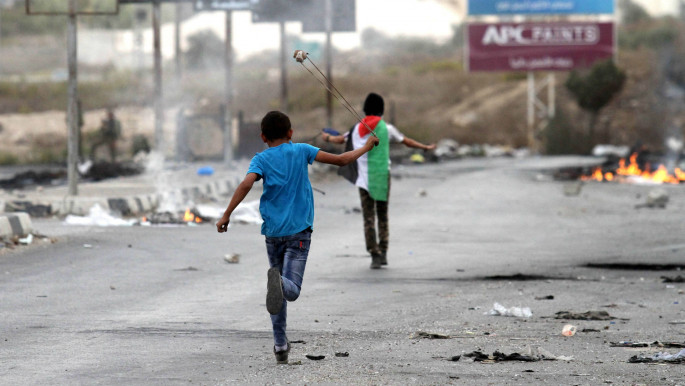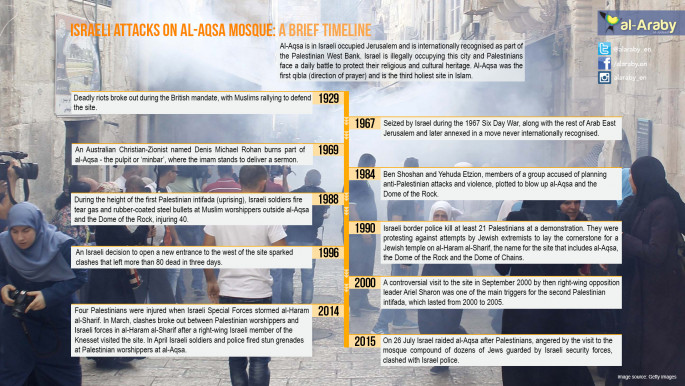Palestinians strike in protest at Islamic Movement ban
Palestinians strike in protest at Islamic Movement ban
Video: Palestinians living in Israel have gone on strike to protest Israel's decision to ban an Islamic political and social organisation.
2 min read
Palestinian towns in Israel went on strike on Thursday in protest against the decision by Israeli Defence Minister Moshe Yaalon to outlaw the northern branch of the Islamic Movement, according to al-Araby al-Jadeed's Arabic service.
Schools and official institutions linked to the Palestinian municipalities were closed down for the whole day.
The strike was organised by the Higher Arab Monitoring Committee, which also called for large protests to take place on Saturday on key roads. The committee has called for a mass protest on November 28, and denounced Yaalon's decision as a policy of political persecution aimed at silencing all Palestinian political movements and parties and their representatives.
Israeli security forces raided the offices of the movement on Tuesday and confiscated files and computers, accusing it of inciting the violence at Jerusalem's al-Aqsa mosque compound that has escalated into weeks of deadly unrest.
"I think banning the Islamic Movement is not a good step, it's unhealthy," said Abd al-Fattah Mahmoud, a resident of Umm al-Fahm. "If the Israeli leaders had any sense, they wouldn't have done it - because aside from it being a political movement it is also a social movement that helps people a great deal."
Alayah Agbariyah agreed: "I disagree with the decision to ban the Islamic Movement. People buy and sell from them and get benefits. Personally, I receive money from them, I have four children and they help me."
Yahia Moussa, a leading Hamas figure, told al-Araby al-Jadeed's Arabic service the ban reflected the state of Israel's politics.
"The decision to ban the Islamic movement is political and conveys the magnitude of the internal crisis the Israel government is going through because of the ongoing popular uprising," he said.
The Northern Islamic Movement is a political and religious popular movement with a large network of local and national community-based organisations that provide social services.
The movement's leader, Sheikh Raed Salah, has denounced the decision to ban the group. In a statement, he declared that the movement would continue to exist "as a long-lasting mission and will prevail on its principles it was founded upon, namely Jerusalem and the blessed al-Aqsa Mosque".
Salah was recently sentenced to 11 months in jail on charges of inciting violence at the mosque compound in a 2007 speech. His lawyers have appealed against the sentence.
Seventeen other Palestinian Arab organisations were also targeted, from Beersheba to Umm al-Fahm, Kafr Kanna and Jaffa, all understood to be linked to the Islamic Movement.
Schools and official institutions linked to the Palestinian municipalities were closed down for the whole day.
The strike was organised by the Higher Arab Monitoring Committee, which also called for large protests to take place on Saturday on key roads. The committee has called for a mass protest on November 28, and denounced Yaalon's decision as a policy of political persecution aimed at silencing all Palestinian political movements and parties and their representatives.
 |
|
| The al-Aqsa mosque has seen weeks of deadly unrest [Getty] |
"I think banning the Islamic Movement is not a good step, it's unhealthy," said Abd al-Fattah Mahmoud, a resident of Umm al-Fahm. "If the Israeli leaders had any sense, they wouldn't have done it - because aside from it being a political movement it is also a social movement that helps people a great deal."
Alayah Agbariyah agreed: "I disagree with the decision to ban the Islamic Movement. People buy and sell from them and get benefits. Personally, I receive money from them, I have four children and they help me."
Yahia Moussa, a leading Hamas figure, told al-Araby al-Jadeed's Arabic service the ban reflected the state of Israel's politics.
"The decision to ban the Islamic movement is political and conveys the magnitude of the internal crisis the Israel government is going through because of the ongoing popular uprising," he said.
The Northern Islamic Movement is a political and religious popular movement with a large network of local and national community-based organisations that provide social services.
The movement's leader, Sheikh Raed Salah, has denounced the decision to ban the group. In a statement, he declared that the movement would continue to exist "as a long-lasting mission and will prevail on its principles it was founded upon, namely Jerusalem and the blessed al-Aqsa Mosque".
Salah was recently sentenced to 11 months in jail on charges of inciting violence at the mosque compound in a 2007 speech. His lawyers have appealed against the sentence.
Seventeen other Palestinian Arab organisations were also targeted, from Beersheba to Umm al-Fahm, Kafr Kanna and Jaffa, all understood to be linked to the Islamic Movement.



